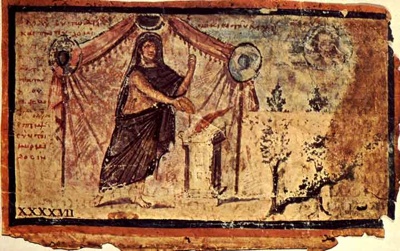Ode To Verse
 I think you never hoped to see
I think you never hoped to see
A poem on this blog by me.
Although the topic here’s Spec Fic,
My conscience feels no twinge or prick.
For—
Were not speculative tales of old
Through timeless epic verses told
By bards who trod rough highways lone
To sing before a fiefdom’s throne?
Let’s see…
There’s Homer, penning legends bold.
And Gilgamesh’s story told
By ancient unnamed poet’s quill
Whose great words students study still.
I’ll admit…
Beowulf put me to sleep,
Though others find it rich and deep.
Virgil’s Aeneid goes way back,
But with my Latin knowledge-lack
I must, alas, forego the pleasure
Of examining that classic treasure.
For a change of pace:
Shahnameh, “The Book of Kings,”
Tells Persian tales of many things.
The work’s the Iranian national poem.
With 60,000 verses, it’s quite a tome.
Did this inspire Rushdie?
The Sanskrit epic Mahabharata
Is hard to rhyme with if you wanta
Fit its name into this ditty.
Unless you’re feeling very witty.
Moving on…
Not
All poems
Have to rhyme.
Meter
Is optional.
Free verse
can be visual.
A vivid,
visceral hurricane
to blow the reader away.
Yet the saga in verse,
Proud precursor of the epic speculative tale,
Today
Withers in the relentless glare of a fatal, scorching neglect.
A traveling bard on his knees,
Panting,
Too weak to stand,
Too dry to sing,
While around him,
Fat prose-mongers sip their coffee
Then take a cooling dip in their lapping pool of words,
Swimming in words,
Splashing them on all who venture near.
Poetry sits in a corner,
Alone and maligned,
Its sweeping dramas silent.
Its soaring grandeur grounded,
Wings clipped by a dearth of eyes,
Voice silenced by a ringing deafness.
Have writers no patience for it?
Have poets have no readers for it?
O gallant ode,
Will you arise one day to warble at the dawn?
Or will you remain a musty book
On a dusty shelf
forgotten?
I think that I shall never see
A TV show lovely as thee.







































I actually loved classic lit because so much of it was epic and grand…
Love it, Yvonne! Very clever.
What fun! Really well done, Yvonne. As I was reading, I couldn’t help but think of Tolkien and Lord of the Rings. No wonder he incorporated so much poetry into his work.
I do think poetry has been on the outs for . . . well, most of my life. I blame this in part to obscure imagery. Once upon a time, a poet could utilize a body of common knowledge and experience and draw out deeper meaning in the process. As our knowledge base has fractured, I think poetry has become less universal.
I also blame it on a generation of poets who thought less about beauty and truth than about self-expression. Lo and behold, there isn’t a great audience for navel gazing. 😆
Becky
Thank you, ladies – I’ve never been a famous fan of poetry, classic-epic or otherwise, but have gradually becoming aware of it as a relevant form. This was in part due to an entry to Novel Rocket’s Launch Pad contest in the YA category, which was a novel in verse. I’d never heard of such a thing and wasn’t sure what to do with it, but when I read it, I was amazed at how visual it was and how quickly & completely I got sucked into it.
Rebecca, you brought up some good points, both about the fractured knowledge base as well as the problem of self-obsessed poets. Another objection I have to some modern poetry is that it seems to delight in being so “deep” and obscure that no one’s quite sure what the poet’s trying to convey.
This is an interesting topic, and I have conflicting thoughts about it. On the one hand, poetry truly is a great form of literature, and the great ancient epics were told in verse. Poetic effects are powerful even in prose, or for that matter in dialog in film. Poetry can condense meaning and hold layers of suggestion, which is much more difficult for prose to do.
However, if we lament poetry’s fall from popularity too much, what does that say about the legitimacy of the blockbuster movies and SF/F novels that we value? How can we avoid being stuffy literary critics? In many ways, the popular artforms are more like the ancient epics than the “literary” forms.
Thanks, Bainspal.
Though often epic in scope, film (whether movies or TV) strikes me as the antithesis of poetry; or maybe lazy man’s poetry. The action all rolls out before you, requiring no participation by the viewer except to keep his eyes open. Poetry is more interactive; the reader or listener must be more engaged.
However, there’s room for all these art forms. It’s interesting that poetry, once exalted, has fallen out of favor.
Hmm… I agree, to an extent. Poetry is wonderfully interactive, more so than novels are (even though all text-based fiction involves interactivity to the extent that the reader constructs the author’s world in his or her mind). In fact, as interactive fiction theorist Nick Montfort argues in the book Twisty Little Passages, the poetic riddle was the original interactive text “game.” Personally, I highly value reader involvement and the mental discourse between the author and the audience.
However, I don’t like calling film media “lazy man’s poetry.” I hate citing a source that I can’t point to, but I read one of C.S. Lewis’s essays in an anthology, where Lewis compares speculative fiction novels (I think he was calling them “romances” in the essay) to poetry. Lewis noted that “romances” opened the “common man” to the same wonders and mysteries that poetry did for the educated and the intellectual elite. Now, it’s no secret that poetry can be obscure, and a lot of people don’t have the right temperment to mine its riches. I don’t think its fair even to implicitly imply that these people are lazy. It’s even worse to imply that people who have no use for poetry are dumb rednecks, while poetry-lovers are inherently intellectually superior. (No one here has made that implication.)
If the form of the “common man’s” epic has passed from pulp novels to movies and television shows (or more likely, has broadened to include film), then I think we have to accept film as fully legitimate, fully literary. A painting is not very interactive, not in the same way that a novel or a poem is. However, a painting is not “lazy,” at least, not a good one. 😉 Now, I think videogames are also coming into the fold of artforms that “common” people enjoy. Interestingly, videogames re-incorporate some of the interactivity that was lost in film.
Nobody here would question the legitimacy of the novel as a form of telling epic stories, right? But the novel was new once. I don’t think we should consider the prose narrative to be the “default” form of storytelling. There is nothing inherently superior about the format of the novel. Poetry has many qualities that no other form can emulate. Film can do things that novels and poetry can’t do, and even videogames can do some things that none of the other forms can do. We should not look down on any form of storytelling.
I agree, actually. I’m just exploring ideas with this post.
As for the “lazy man’s” poetry, I’m calling myself names here, because I only watch TV or movies when I’m feeling too tired/brain dead to concentrate and want to do something easy and mindless. But I know filmmaking is a serious business as well as a legitimate art. Perhaps it’s just me who uses it as a drug.
I’d never thought of videogames as an art form, but now that you bring it up, I can see that.
[…] I’ll take the lazy way out and send you over to my post of yesterday on Speculative […]
[…] fiction has existed, in one form or another, since the beginning (as I observed awhile back in a post about epic poems). And that’s why I expect it won’t be going away any time soon. The format, the delivery, and […]
[…] mentioned some older-than-dirt stuff we don’t usually think of as speculative fiction, like epic poems and John Bunyan’s Pilgrim’s […]